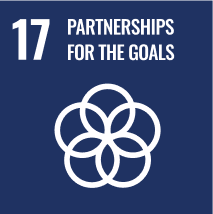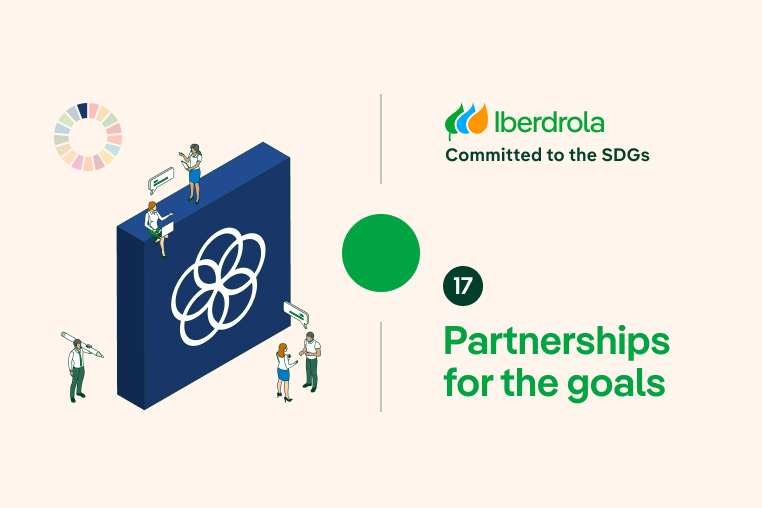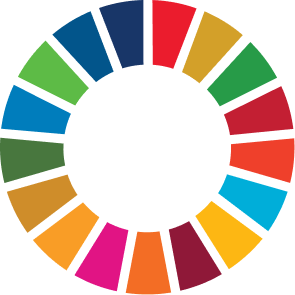SDG 17: partnerships for the goals
We contribute to the achievement of the SDGs through our participation in international and national partnerships
As part of its commitment to the UN Sustainable Development Goals, Iberdrola Group contributes directly to achieving SDG 17 through its adherence to and participation in different projects and initiatives, both globally and in the countries where it operates. It aims to strengthen the means to implement the actions necessary to achieve the 17 goals and revitalise the Global Partnership for Sustainable Development.
Goal 17: Partnerships for the goals. Video voice transcription (Spanish version) [PDF]
SDG 17: Partnerships to achieve the goals - what is it and why is it so important?
SDG 17 aims to strengthen the Global Partnership for Sustainable Development, based on the idea that the SDGs can only be achieved through strong global partnerships and cooperation. Unions and alliances between different actors —such as governments, the private sector and civil society— enable the mobilisation and sharing of knowledge, technical capacity, technology and resources.
According to the UN in its 2023 SDG Progress Report, progress has been uneven. Progress has been made in areas such as development aid, the flow of remittances and access to technology. However, the UN considers that financing for development remains a major challenge, in particular in low-income countries. Not to mention the geopolitical tensions that have made cooperation more difficult, as well as record inflation, rising interest rates and a looming debt burden that many developing countries are grappling with.
The report notes that debt levels in many countries reached record highs during the pandemic, with the total external debt of low- and middle-income countries reaching $9 trillion in 2021, an increase of 5.6%. By the end of 2022, more than half (37 out of 69) of the world's poorest countries were at high risk of over-indebtedness or already suffering from it. These debt levels represent a potential threat to economic growth.
Moreover, despite an unprecedentedly large increase in global trade post-pandemic —$32 trillion in 2022— the share of exports from the least developed countries stagnated, their share of global trade in goods was only 1.1%, an increase of only 0.07 percentage points. In terms of internet use, an estimated 5.3 billion people —66 % of the world's population— used the internet in 2022, a substantial increase from the 40 % coverage observed in 2015. However, 2.7 billion people remain unconnected, so there is still a long way to go to reach the goal of universal connectivity by 2030. In addition, globally, 69% of men use the internet compared to 63% of women, meaning that there are 259 million more male internet users than female users.
Reversing this reality has become an overriding objective in the international arena. For this reason, it is vital to protect and continue partnerships to leave no one behind. Only the union of all actors will make it possible to achieve the goals set, which is why SDG 17 of the UN Sustainable Development Goals, adopted in September 2015 as part of the 2030 Agenda, is so important.
Iberdrola aligned with the Objectives of Sustainable Development
Keys to understanding partnerships to achieve goals

-
Debts, theft and tax fraud By November 2022, more than half (37 out of 69) of the world's poorest countries were at high risk of over-indebtedness or already suffering from it.
-
Digital divide In 2022, 66% of the world's population (5.3 billion people) will be using the Internet, compared to 40% in 2015. In the same year, 259 million more men than women were using the Internet.
-
Achieving the SDGs These can only be achieved through strong global partnerships and cooperation. Unions and alliances between different actors enable the mobilisation and sharing of knowledge, expertise, technology and resources.
Countries with the highest percentage of digital poor

- Venezuela
- Chad
- R. Central African Republic
- Salomon Islands
- Burkina Faso
- Guinea-Bissau
- Madagascar
- Mozambique
- Burundi
- Malawi

Main causes
O apoio de diferentes agentes para o cumprimento dos ODS tem sido constante, mas ainda é escasso e ainda com desafios pela frente. Os recursos financeiros continuam sendo insuficientes e as tensões comerciais entre os países têm aumentado. Além disso, a pandemia global de COVID-19 traz consigo um declínio no investimento estrangeiro direto e uma queda nas remessas.

How can we achieve partnerships?
Helping developing countries to achieve long-term debt sustainability; improving inter-country cooperation in and access to science, technology and innovation; increasing international support for effective capacity-building activities; pursuing policy and institutional coherence; and enhancing the Global Partnership for Sustainable Development, among others.
Source: World Data Lab, UN and World Bank
 SEE INFOGRAPHIC: Keys to understanding partnerships to achieve goals [PDF]
SEE INFOGRAPHIC: Keys to understanding partnerships to achieve goals [PDF]
Aims of SDG 17: Partnerships for the goals
Within SDG 17, the specific aims set for the year 2030 are:
- On a financial level: mobilise resources by providing international support to developing countries so that they can better collect their tax revenues. Also, help them achieve long-term debt sustainability. In addition, mobilise resources for the countries that need them most and promote investments in them.
- At a technological level: improve cooperation between countries in science, technology and innovation and access to them. Seek to promote the development of environmentally sound technologies and their transfer and diffusion to developing countries.
- At the capacity building level: increase international support for effective and targeted capacity-building activities in developing countries.
- On systemic issues: search for policy and institutional coherence (enhancing global macroeconomic stability and improving policy coherence for sustainable development); enhance the Global Partnership for Sustainable Development and promote effective partnerships in the public, public-private and civil society spheres; and build on existing initiatives to develop indicators to measure sustainable development progress.
Our contribution to SDG 17: Partnerships to achieve the goals
- We have been part of the United Nations Global Compact since 2002, an initiative whose mission is to generate an international movement of sustainable companies to create the world we want.
- We are a constituent member of the Spanish Global Compact Network, created in 2004 as the Spanish Global Compact Association (ASEPAM).
- We are a strategic partner of the UN's Spanish Sustainable Development Network (SDSN) and collaborate with its youth initiative SDSN Youth.
- We collaborate with the Spanish Climate Change Office and the Spanish Green Growth Group.
- We launched The Day After will be, a platform that aims to generate transformative partnerships that address the challenges posed by the SDGs.
- We actively participate in climate negotiations and policies with a presence at major climate summits.

International agreements
25 years of searching for consensus on the fight against climate change.

Corporate volunteering
A global community of social action for sustainable development.

Climate change
Committed to a decarbonised energy model.

Climate action
Leading the way towards a sustainable economy.























